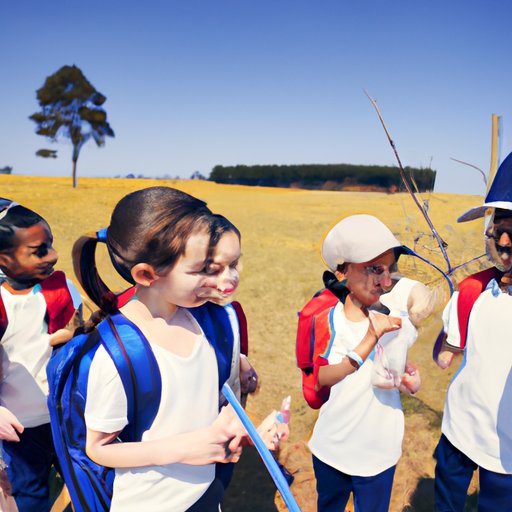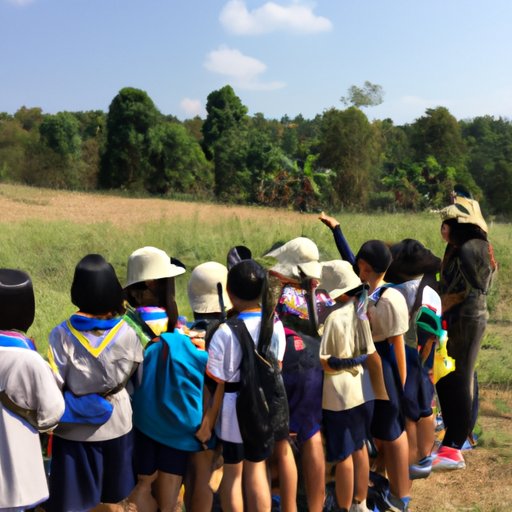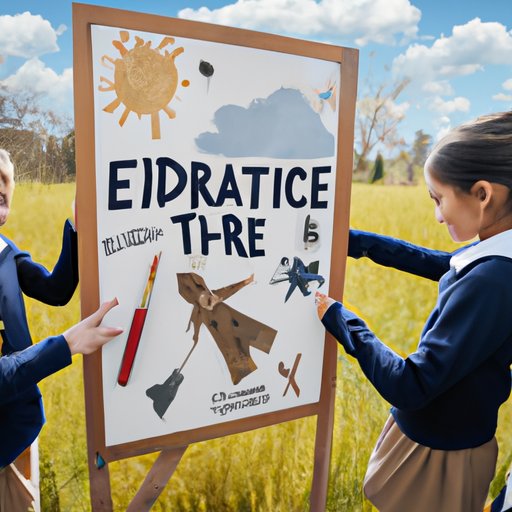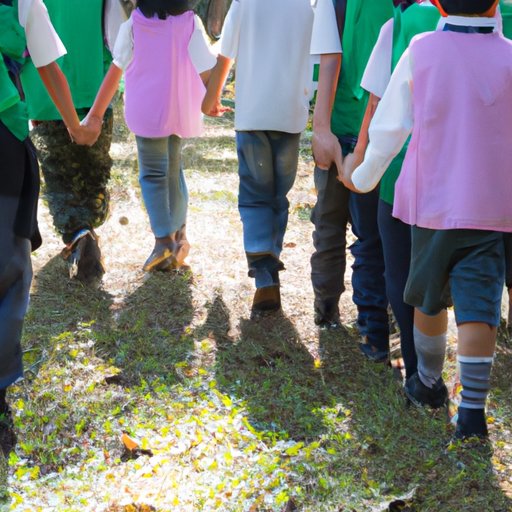Introduction
Field trips are a great way to engage students in meaningful and memorable learning experiences. By taking students out of the classroom, they can gain valuable insights into their subject matter while also having fun and making connections with peers. Field trips offer educational, social, and creative benefits that can be experienced both in the short-term and long-term.

Educational Benefits of Field Trips
Field trips can be an integral part of the educational process, providing unique opportunities to learn and explore. Here are some of the educational benefits of field trips:
Enhancing Curriculum
Field trips can supplement traditional classroom instruction by allowing students to explore subject matter in more depth. For example, a science class may visit a local nature center to study plants and animals in their natural habitats. Field trips can also provide hands-on learning opportunities, such as visiting a factory to learn about manufacturing processes or touring a museum to gain insights into history.
Providing Real-World Experiences
Field trips can bridge the gap between what is taught in school and the real world. For instance, a business class may visit a company to observe how it operates or a language class may take a trip to a foreign country to practice speaking the language. By providing students with real-world experiences, field trips can make abstract concepts more tangible.
Increasing Knowledge Retention
Field trips can help students better understand and remember their course material. By engaging in activities outside of the classroom, students can make connections between different subject areas and develop a deeper understanding of the material. Additionally, field trips can provide a change of pace from the typical classroom setting, which can help keep students focused and interested in the material.
Social Benefits of Field Trips
In addition to educational benefits, field trips can also offer a number of social benefits for students. Here are some of the ways in which field trips can foster social development:
Developing Relationships and Collaboration
Field trips can provide an opportunity for students to bond and develop relationships with their peers. By spending time together outside of the classroom, students can get to know each other better and build trust and respect. Additionally, field trips can encourage collaboration as students work together to complete tasks or solve problems.
Encouraging Teamwork
Field trips can also teach students the importance of teamwork and working together to achieve a common goal. By engaging in activities such as scavenger hunts or group projects, students can learn the value of cooperation and compromise. Field trips can also provide students with an opportunity to practice communication skills, such as active listening and conflict resolution.
Fostering Independence
Field trips can also help students become more independent by teaching them to navigate unfamiliar environments. By exploring new places, students can learn to think on their feet and problem solve. Additionally, field trips can help students develop confidence in their abilities and become more self-reliant.
Impact of Field Trips on Student Engagement
Field trips can have a positive impact on student engagement by boosting motivation and creating a positive learning environment. Here are some of the ways in which field trips can increase student engagement:
Boosting Motivation and Engagement
Field trips can be an effective way to motivate students and boost engagement in learning. By taking students out of the classroom, they can become more excited and engaged in the subject matter. Additionally, field trips can provide a break from the monotony of everyday classroom instruction, which can help keep students interested in the material.
Creating a Positive Learning Environment
Field trips can also create a positive learning environment in which students feel supported and encouraged to succeed. By providing students with an opportunity to learn in a relaxed atmosphere, they can become more comfortable and confident in their abilities. Additionally, field trips can provide a sense of community among students, which can lead to increased engagement.
Generating Interest in Learning
Field trips can also generate interest in learning by exposing students to new ideas and perspectives. By engaging in activities such as visiting a museum or participating in a debate, students can gain insights into different subjects and become more curious about the world around them. Additionally, field trips can provide students with an opportunity to explore their interests and discover new passions.

Value of Experiential Learning Through Field Trips
Field trips can provide an opportunity for students to engage in experiential learning, which can have a number of benefits. Here are some of the ways in which experiential learning through field trips can benefit students:
Developing Leadership and Social Skills
Experiential learning through field trips can help students develop leadership and social skills. By engaging in activities such as team building exercises or service projects, students can learn to work together and cultivate interpersonal relationships. Additionally, field trips can provide students with an opportunity to practice decision making, problem solving, and communication skills.
Applying Theory to Practice
Field trips can also provide an opportunity to apply what students have learned in the classroom to real-world situations. By engaging in activities such as visiting a historical site or participating in a simulation, students can gain a better understanding of how theory applies to practice. Additionally, field trips can provide students with an opportunity to develop critical thinking and analytical skills.
Growing Self-Confidence
Experiential learning through field trips can also help students grow their self-confidence. By engaging in activities outside of the classroom, students can become more comfortable in unfamiliar situations and develop a sense of accomplishment. Additionally, field trips can provide students with an opportunity to practice self-advocacy and gain recognition for their efforts.

How Field Trips Enhance Creativity and Imagination
Field trips can also be beneficial for students’ creativity and imagination. Here are some of the ways in which field trips can inspire creativity and imagination:
Opening New Perspectives
By taking students out of the classroom, field trips can provide them with an opportunity to explore new perspectives. For example, a field trip to a local farm may expose students to a different way of life. Additionally, field trips can provide students with an opportunity to observe, reflect, and gain insights into different cultures and customs.
Exploring New Ideas
Field trips can also provide students with an opportunity to explore new ideas and push the boundaries of their creativity. By engaging in activities such as visiting an art gallery or attending a play, students can gain inspiration for their own creative endeavors. Additionally, field trips can provide students with an opportunity to brainstorm, experiment, and develop their own unique ideas.
Thinking Outside the Box
Field trips can also help students think outside the box by exposing them to different ways of looking at things. By engaging in activities such as visiting a museum or participating in a debate, students can open their minds to new possibilities and develop innovative solutions to problems. Additionally, field trips can provide students with an opportunity to challenge their assumptions and consider alternative points of view.
Conclusion
Field trips can provide educational, social, and creative benefits to students. By taking students out of the classroom, they can gain valuable insights into their subject matter while also having fun and making connections with peers. Field trips offer a variety of benefits, including enhancing curriculum, providing real-world experiences, increasing knowledge retention, developing relationships and collaboration, encouraging teamwork, fostering independence, boosting motivation and engagement, creating a positive learning environment, generating interest in learning, developing leadership and social skills, applying theory to practice, growing self-confidence, opening new perspectives, exploring new ideas, and thinking outside the box.
Overall, field trips can be an effective way to engage students in meaningful and memorable learning experiences. They can provide an opportunity for students to learn in a relaxed atmosphere and gain valuable insights into their subject matter. By emphasizing the benefits of field trips, educators can ensure that students have access to these enriching opportunities.
(Note: Is this article not meeting your expectations? Do you have knowledge or insights to share? Unlock new opportunities and expand your reach by joining our authors team. Click Registration to join us and share your expertise with our readers.)
